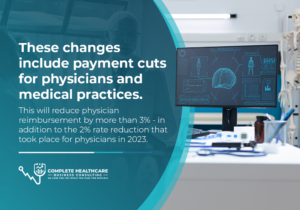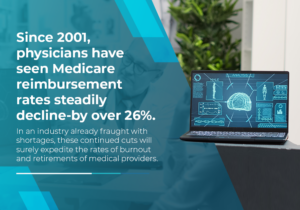Medicare rate reduction to physicians and medical practices in 2023 and 2024
New Medicare reimbursement rates went into effect on January 1, 2024. With a second vote by Congress in late January, which didn’t amend the cuts to the 2024 Medicare Physician Fee Schedule, it’s clear—we must act. It’s critical for physicians, patients, and advocates to band together to help reform the Medicare system in a way that works for everyone involved once and for all.
The Flawed Medicare Physician Payment System
Physicians are reimbursed for services rendered by a Prospective Payment System (PPS). (The alternative to a PPS is a fee-for-service payment option.)
The problem is that Medicare physician payment is a set amount. A number that’s reached based on care standards and averages—not on individuals and their needs.
Recent Developments: CMS Approval of a 3.4% Reduction in Medicare Physician Payments for 2024
Interestingly, physicians are the only group that doesn’t get a rate increase based on the annual Medicare Economic Index to cover the costs of running a practice. And once again, Medicare is changing in 2024.

With medical providers having been faced with intense hurdles in the last several years including the COVID pandemic, burnout, and inflation, this reduction in Medicare rates could be the final straw. Medical practices and physicians can’t spread themselves much more thinly.
Potential Impact on Patient Access to Care
Not only are providers impacted by these Medicare rate reductions—patients will truly be the ones to suffer. Especially patients without access to medical care because a practice has shuttered its doors.
CMS believes these changes will improve patient care when in reality, a patient could find themselves unable to continue seeing a provider because that practice no longer accepts Medicare, and faced with even longer delays in care because they must find a new provider.
Medicare patients deserve better.
The Consequences of Inaction
Disproportionate Impact on Small, Independent, and Rural Physician Practices
Should these changes to the Medicare Fee Schedule remain as-is, physicians with small, independent, and rural practices will be hit the hardest. These shifts could result in fewer practices accepting Medicare and even—practice closures.
Providers could see a surge in new patients (due to other practices shuttering their doors), which could lead to physicians feeling overworked and hitting burnout. This, of course, could result in more healthcare providers taking early retirement or facing their own medical battles thanks to the impact of stress.
Concerns for Physicians Treating Low-Income and Historically Marginalized Patient Communities
Patients in low-income and historically marginalized groups will be impacted the most by these Medicare cuts. The ever-increasing cost of healthcare is felt most deeply by patients in these communities. Often these patients end up going into debt to get basic healthcare needs met.
Additionally, if physicians retire or close their practices, patients in these communities could struggle to find new providers.
Lack of Automatic Inflation Updates: The 26% Lag in Medicare Physician Payments since 2001
 Inflation has impacted everything from housing costs to grocery prices in the last few years. But inflation has been problematic for physicians for the last 23 years.
Inflation has impacted everything from housing costs to grocery prices in the last few years. But inflation has been problematic for physicians for the last 23 years.
Urge Congress to Act Now
For the last 3 years, there have been continued cuts to Medicare services. These latest reductions to physician payments only add insult to injury.
Should Congress fail to amend these changes before the end of the year, they could become permanent, which will worsen patient care and serve as a further hindrance to physicians. Congress has until March 1st to change its proposal for the better.
The Importance of Advocacy: Contacting Representatives and Senators
Be the change—tell Congress to cancel the cut now! By contacting your State Representatives and Senators you’re exercising your rights and advocating for those who can’t always advocate for themselves. Your voice matters and it needs to be heard right now.
Solutions to Rate Reductions
Strategies to Mitigate the Impact of Payment Reductions
If the payment reductions are to remain in place, there are conversations that must be had around mitigating the impact of those cuts. For example,
Advocating for Fair and Sustainable Physician Payment Models
It’s clear the current physician payment models aren’t working. One thing we could look to is
Collaborative Efforts Between Healthcare Stakeholders and Policymakers
At the very least, a strong vision backed by consistent actions will move the needle in a more positive direction for physicians and patients.
Why CHCB Consulting
We work to protect your practice from the onset of new healthcare regulations such as Medicare rate cuts.
There are several reasons to hire a healthcare business consultant. And many healthcare providers and practices already trust Complete Healthcare Business Consulting. With our tools and support you’ll have everything you need to create a profitable and impactful medical practice.
This is an urgent issue that will greatly impact both physicians and Medicare patients.
As it stands, physicians, medical providers, and patients have faced many scary situations in the last few years. Medicare cuts shouldn’t be another burden for them to bear.
There’s no time to waste—the stopgap spending agreement issued by Congress in January 2024 will only keep the government afloat until March. We must act and act quickly to reform Medicare and protect medical providers and patients.





